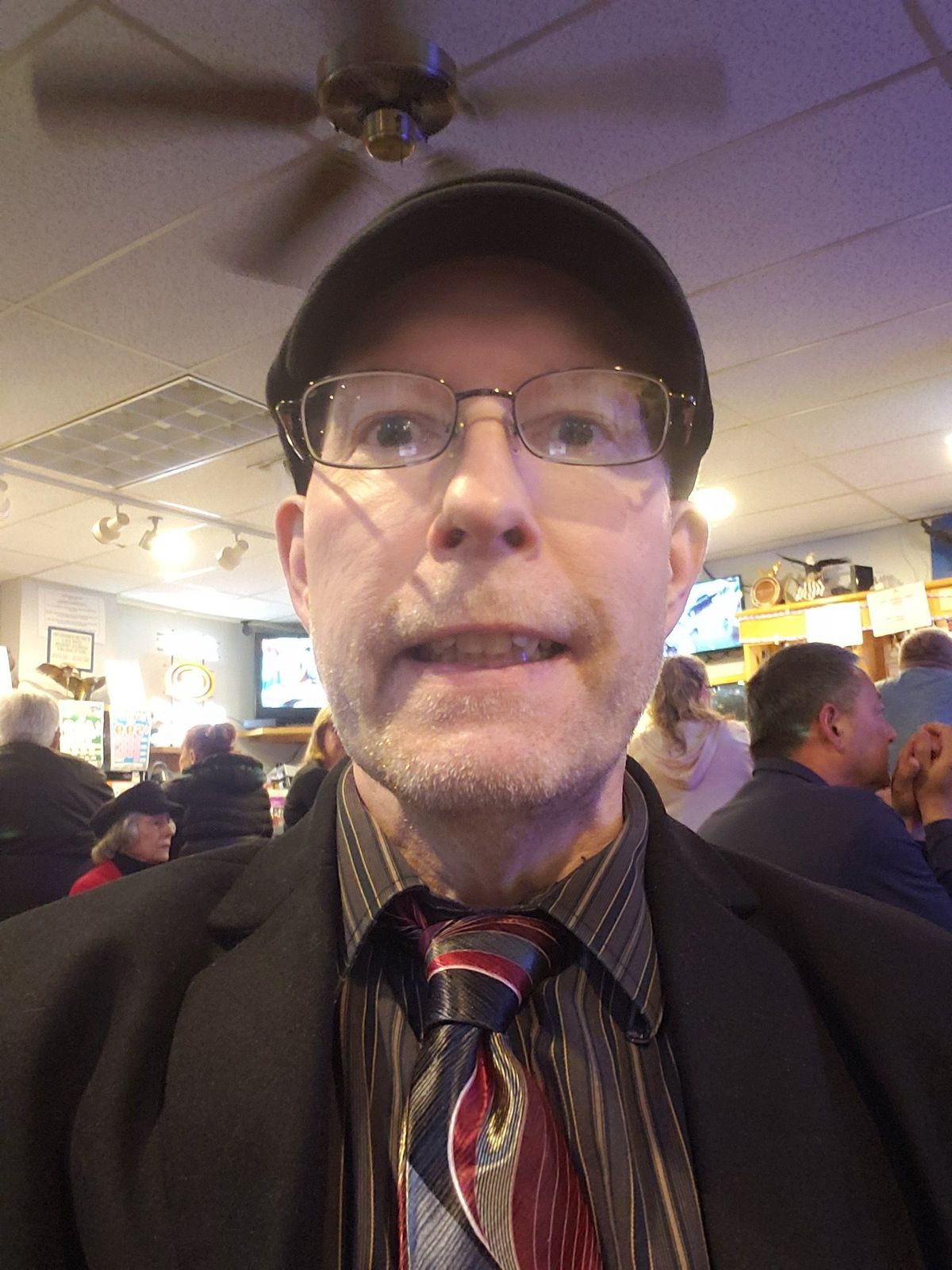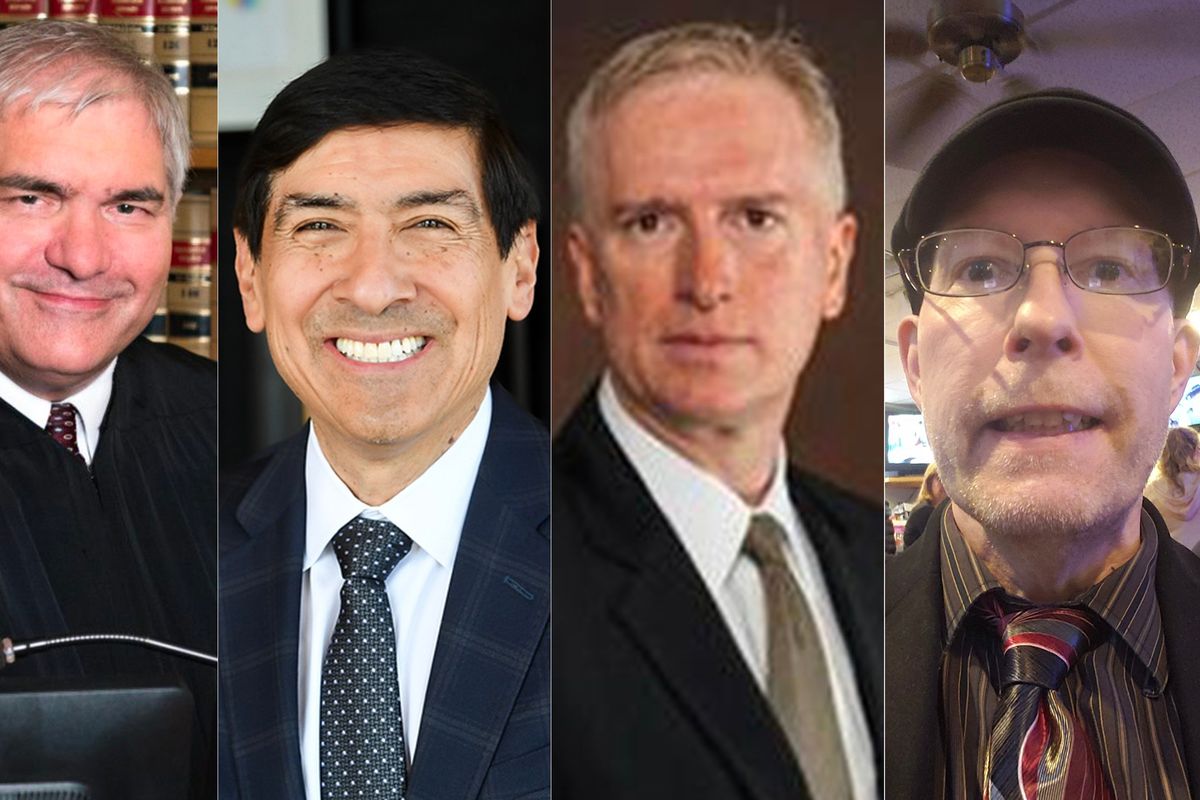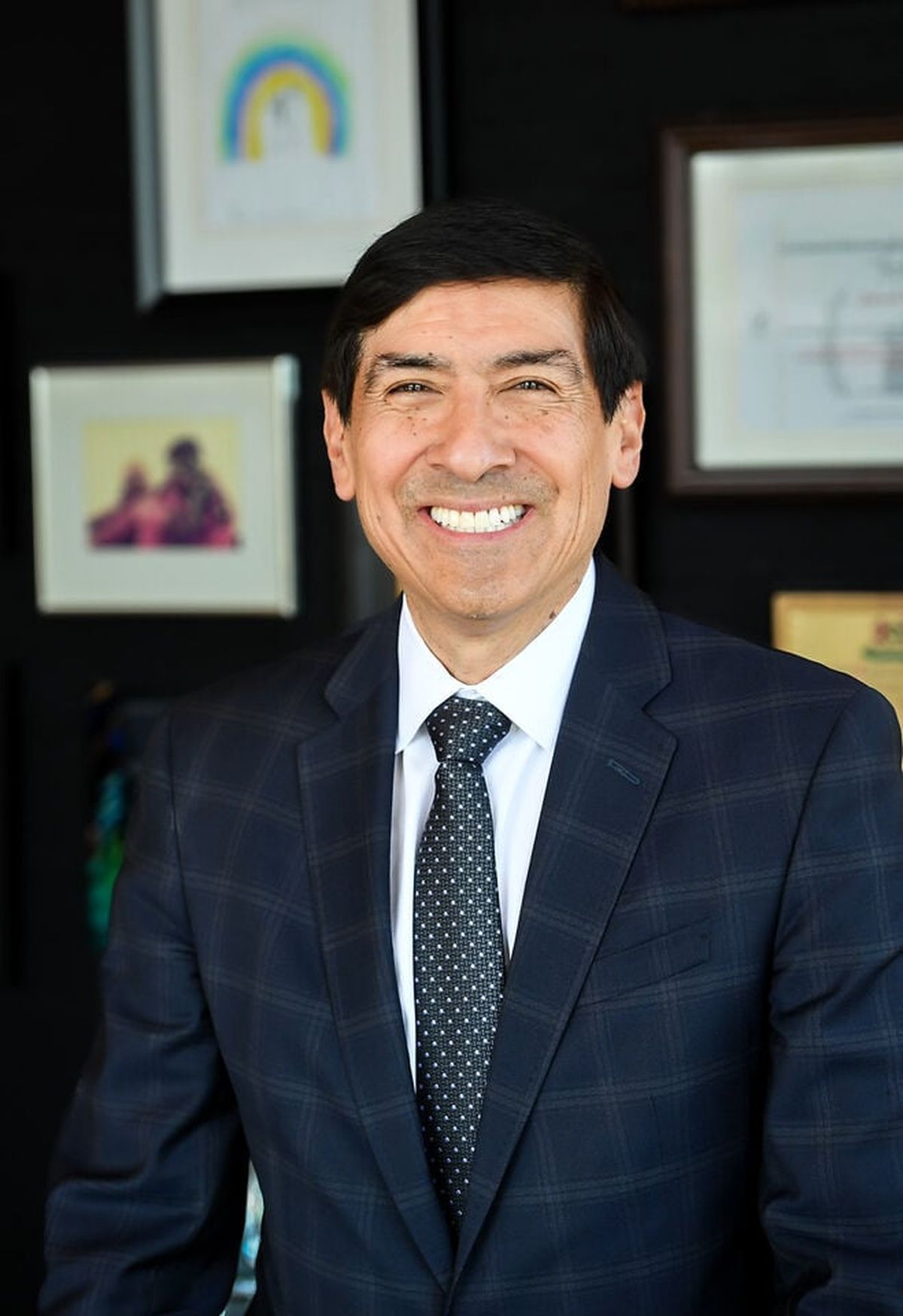Seattle attorney Sal Mungia leads fundraising, endorsement race for open Washington Supreme Court seat, but opponents say he was picked by elites
Candidates for the open seat on the Washington State Supreme Court (from left to right) Judge Dave Larson, Salvador “Sal” Mungia, Todd Bloom, David Shelvey. (Courtesy)
In the race for a rare open seat on the Washington State Supreme Court, one candidate has amassed a significant advantage.
Longtime Seattle attorney Salvador “Sal” Mungia has raised six times more money than the other three candidates combined. He’s also garnered over 600 endorsements, including from all but one of the sitting justices, Gov. Jay Inslee, former Gov. and Attorney General Chris Gregoire, former Gov. Gary Locke and Attorney General Bob Ferguson.
The other candidates, Federal Way Municipal Court Judge Dave Larson, tax attorney and veteran Todd Bloom and sole practitioner David Shelvey have struggled to raise competitive funds and endorsements.
The open seat, left by Justice Susan Owens, who has to retire this year because she will turn 75 in August, is a rarity. The most recent open seat was won by Sheryl Gordon McCloud in 2012. Since then, justices have retired before the end of their term, allowing Inslee to appoint their replacements.
Larson, who challenged sitting justices in 2016 and 2020, said Mungia is clearly the chosen candidate by Washington’s political elite.
“Are people going to have a choice again or is it going to be the elite who decide again?” Larson said. “Do you want somebody who the justices want, or do you want who the people need?”
Larson himself has garnered significant support in the past. In 2016, when he challenged now-retired Justice Charles Wiggins, over $700,000 was spent in support of Larson and another $412,000 was spent against Wiggins, according to filings with the state Public Disclosure Commission.
That support dwindled in 2020 when he challenged Justice Raquel Montoya-Lewis. Larson raised $46,000 during that election cycle. However, neither race had a primary election contest.
Mungia said he has garnered such widespread support because he is clearly the most qualified candidate, having argued complex legal issues at every level from state court to the United States Supreme Court.
“I think the work that I’ve done doing complex litigation where I’ve had to brief both state and federal constitution issues – all that really makes my experience stand out from the other three that are running,” Mungia said.
Candidate pitches
Larson, who has been a municipal court judge since 2008, said he would bring viewpoint diversity to the court and push for court reform and unification to make the legal system easier to navigate.
“The Supreme Court needs to have more leadership when it comes to what’s happening in our communities and to bring us together as courts,” Larson said.
He has worked with the therapeutic courts in Federal Way and hopes to push for a more standardized model that is “participant focused.” Larson said it’s confusing for people charged with crimes, victims and attorneys to navigate different requirements and processes in different jurisdictions.
“The best way to describe it is like a jigsaw puzzle,” he said. “Each of us see this as an isolated piece of the puzzle.”
Larson hopes to put the puzzle together, in part with a statewide universal filing system. He also wants to improve how people move through different parts of the justice system, from incarceration to probation.
Mungia has done a variety of litigation, largely appeals at Western Washington law firm Gordon Thomas Honeywell, where he is a partner. He has also served on a host of boards and done pro bono work through the American Civil Liberties Union.
His largest focus has been on access to justice, something he hopes to expand if elected, along with combating discrimination and bias in the legal field.
Many people with legal problems, including domestic violence, tenant issues and veteran benefits, can’t afford an attorney.
“I couldn’t afford to pay me if I have legal problem,” Mungia said. “And that’s true for so many people that have legitimate legal issues.”
Mungia hopes to lobby and educate lawmakers to increase funding for civil legal aid attorneys.
Bloom touts his life and legal experience as making him the best fit for the job. After 9/11, Bloom served in the Navy for a decade before starting at one of the “big four” accounting firms. As an attorney, he has mostly dealt in tax law. He is also a cancer survivor.
Those experiences and his lack of ties to the state’s political establishment make him a good fit for the job, he said. He has not asked for endorsements.
“Overall, it’s my life experience,” he said. “It’s not just what I did as a lawyer.”
Bloom has run for the United States House twice before as a Republican, once against Derek Kilmer in 2016 and again in 2020. He did not advance past the primaries in those races.
Recently, he has become a governor for the Washington State Bar Association and has “some concerns with regards to respect for the law.” He is also a member of a local chapter of the Federalist Society, a conservative legal group that has garnered attention in recent months.
“We’ve got prosecutors who don’t really want to prosecute or don’t feel like we can prosecute,” Bloom said. “And we’ve got judges who don’t really seem to take public safety seriously.”
Shelvey said he would work to make decisions that benefit the whole of society if elected.
He initially planned to run for Pierce County Superior Court but thought with his tendency to be more inquisitive the state Supreme Court would be a better fit.
Shelvey is the president of the Fraternal Order of the Eagles of Tacoma and said dealing with the organization’s rules and questions from members has prepared him for the role of justice.
He acknowledges that he has done little appellate work and has no judicial experience but points to the fact that neither Bloom nor Mungia have judicial experience, making it less of an issue.
The issues
The shortage of public defenders in Washington is a huge problem, Larson said. He thinks increased training, better compensation and use of public defender districts that serve multiple jurisdictions would help with the problem.
He criticized the current Supreme Court’s lack of leadership on the issue, saying they should advocate for increased funding.
“Our court seems to sit back and make everybody else solve problems,” Larson said.
Mungia agreed that educating legislators on the importance of making sure public defenders and prosecutors are equally funded is extremely important.
“I really do think a part of that is educating the policymakers who control the purse strings,” Mungia said.
He also hopes to learn more about public defenders’ needs during the public comment process on the court’s new proposed case load standards.
Bloom said two types of people take public defense jobs: people who want to make it their life work and people who want a job at a top firm but don’t have the grades to get one.
While public defense is important, Bloom said the proposed new caseload standards are unrealistic, and the court needs to consider who is going to pay for more public defenders.
Shelvey was not aware of proposed changes to case load standards. He said Pierce County was not having an issue with public defenders to his knowledge, but he had not looked into other counties.
Earlier this year, the Supreme Court authorized alternative pathways to become an attorney in Washington, making the bar examination no longer a requirement.
Larson is tentatively supportive, he said. The No. 1 focus should be making sure attorneys are delivering good legal service, Larson said.
“The bar exam is an indicator of success, not the indicator of success,” he said.
Mungia is extremely supportive of the directive. Historically, attorneys nationwide have used the bar exam to protect the profession, he said.
The goal of having licensing requirements is to protect the public by having competent attorneys, Mungia said.
“I don’t know whether the bar examination is a good mechanism for that,” he said, noting the exam is largely memorization-based. “It’s not going to test them on their competency in the area in which they’re going to practice.”
Bloom said the new plan “needs some adult supervision.”
He’s concerned that the quality of legal services will go down if people don’t have to pass the bar or complete law school.
Shelvey is supportive of changes to the bar exam but not of removing the exam entirely. He was not aware of the proposed new pathways.
“That I disagree with, because the whole reason behind the bar exam is to show that you have some general knowledge about the law,” Shelvey said.
In 2020, the Supreme Court penned an open letter encouraging legal professionals to root out racism in the criminal justice system.
Mungia, who is biracial, said the letter personally made him “proud.”
“It was an open letter not just for judges, but for the whole legal community to really work to face racial justice or racial injustice,” Mungia said. “That letter had such a profound impact, I think not only within the legal impact on our state, but I think that letter had an impact across the country.”
Larson acknowledged the system “does aggravate racism” but criticized the court for paying lip service to the issue instead of taking action.
A study on minorities showing up for jury duty showed that Federal Way was among the worst in the state, Larson said. He wrote educational op-eds to local papers and went to multiple cultural fairs to do outreach to the minority communities in his area to educate them on jury duty, Larson said.
The Supreme Court, Larson said, didn’t even encourage outreach, instead creating a court rule aimed at eliminating exclusion of jurors on the basis of race or ethnicity.
While the court rule is great, Larson said the justices could have done more.
“People are greeted with a system that’s hostile to them,” Larson said. “ ‘I run a repair shop, not a junkyard.’ ”
Bloom said the Supreme Court stepped out of line writing the letter. He said the death of George Floyd was very sensationalized. Bloom said discussion of tearing down systems of oppression often means chipping away at the Constitution.
The courts are not irredeemably racist, Bloom said.
Shelvey said he’s supportive of efforts to remove bias in the court system.
Larson said he is running in part to get politics out of the judicial system. Judges shouldn’t evaluate cases with a focus on public policy but instead following the Constitution, the way it’s written, he said.
Larson has spoken at a number of conservative events, including Patriots United Washington. Larson said he goes where he’s invited and that Democrats, who have largely endorsed Mungia, haven’t invited him to speak.
Most judges in the state have been appointed by Inslee or his predecessors, which Larson said is wrong.
They’re appointed “with no check and balance, no confirmation process,” he said.
Larson has sparred with Inslee, filing a lawsuit about vaccine mandates, which was later dismissed. He argued it was exceeding the governor’s authority to mandate state employees get vaccinated against COVID-19, and that only legislators could turn that kind of mandate into law.
Mungia said he hopes to help restore trust in the judiciary by going where the law tells him, not approaching a case with a specific decision in mind.
“The only view that people should be concerned about is whether I am the type of person that can set aside my biases. … because your one overwhelming goal is to follow the rule of law where it takes you,” Mungia said.
While he acknowledges his widespread support from the state’s leaders, largely Democrats, Mungia said it’s due to his legal experience, not party politics.
“I’m happy to stand on my legal career,” Mungia said.
Editor’s note: This story has been updated to clarify Shelvey’s work experience.




